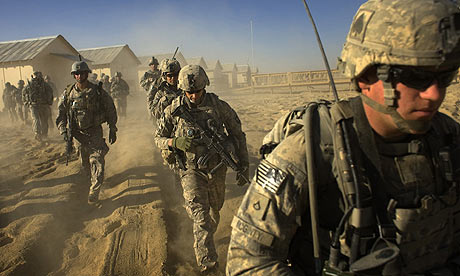
"America is powerful, has more money, but we are lions here. Lions have the habit of not liking strangers getting into their house," Karzai said.
"We want our sovereignty from today. Our relations should be between two independent countries," he said in a speech that appears to have been designed to boost his nationalist credentials with a domestic audience.
He was also broadly critical of NATO, saying the intended departure of NATO troops in 2014 was "good for Afghans."
NATO plans to withdraw most combat troops by that date, but is currently negotiating what sort of long-term presence they might have here.
Karzai called the national assembly, or loya jirga, to sound out tribal elders on a long-term pact with the US military and harness their consent.
The conditions Karzai spelled out on a long-term foreign military presence were mostly formalizations of long-held Afghan complaints about the international presence here.
"I'd like to tell them they can't arrest any Afghan on our soil and they can't have prisons. We have a justice and security system and that is up to us," he said.
He said he thought a deal that enabled US forces to have bases in Afghanistan was beneficial but added they would not be able to attack Afghanistan's neighbors from inside the country, conduct night raids, search houses, or arrest Afghans.
He also said that night raids by foreign troops must stop completely and that NATO troops should not be allowed to search people's houses - complaints that have already prompted NATO to adjust its operations and incorporate greater Afghan assistance.
The speech was made before an audience who in part -- like many Afghans -- are skeptical of both his alliance with NATO and his leadership in general.
He was also keen to court Iran - and perhaps its supporters in the audience of elders - by saying: "We want to say that Iran is our brother. During the years of jihad, Iran has been one of the best countries for hospitality for Afghans. They are our brother."
He also voiced fears that Afghanistan could see the same instability and collapse witnessed after the Soviet withdrawal in the late 80s.
The loya jirga, or national assembly, is considered by many an important step towards any possible peace deal with elements of the insurgency.
Hundreds of community leaders have been invited from across the country, with the meeting a test of Karzai's potency as a cohesive leader.
The turnout Wednesday was considerable.
Troops, security officials, and police lined the roads outside the loya jirga tent, near the Intercontinental Hotel on the capital's outskirts.
The Taliban have long threatened to disrupt the event.
On Monday, security forces killed a suicide bomber near the meeting site. The attacker was wearing a suit and carrying a briefcase when he was stopped, said General Ayoub Salangi, chief of Kabul police.
On Sunday, a Taliban-affiliated website published what it claimed was a leaked document containing confidential government security plans for the meeting.
The leaked security plans included a detailed satellite map of the area and purported details of the security arrangements, but the Interior Ministry immediately dismissed them as fake.
No comments:
Post a Comment